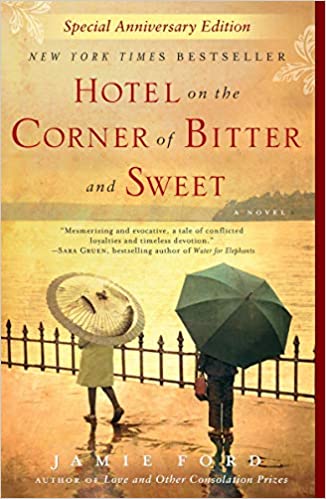 A casual reading of this novel will present the story of a Chinese boy falling in love with a Japanese girl just as the Japanese were being evacuated from Seattle into concentration camps in 1942. The sorry history of that American policy sets the framework for high tension within between families of all different races, not just between Japanese and Chinese families.
A casual reading of this novel will present the story of a Chinese boy falling in love with a Japanese girl just as the Japanese were being evacuated from Seattle into concentration camps in 1942. The sorry history of that American policy sets the framework for high tension within between families of all different races, not just between Japanese and Chinese families.
Protagonist Henry Lee attends a Caucasian private school where he meets Keiko Okabe as they work in the cafeteria to earn their tuition, and where Henry is taunted by white students as if he is Japanese, a belief enhanced by his budding romance with Keiko.
He has an arms-length relationship with his father who speaks no English but insists that Henry speak only in English, which he does not understand . . . OK, it’s more distant than arms can reach. The relationship becomes even more sour when the relationship between Henry and Keiko is revealed, to the point where the father is not even trying to communicate.
 Keiko is, of course evacuated, and Henry does all he can to maintain their communication, including working at the first camp she as at, then taking a long bus ride to the second. As time goes on, letters from Keiko become less frequent and ultimately stop.
Keiko is, of course evacuated, and Henry does all he can to maintain their communication, including working at the first camp she as at, then taking a long bus ride to the second. As time goes on, letters from Keiko become less frequent and ultimately stop.
But the real story in the book is the dissolution of any familial relationship between Henry and his father and serves as an example for the permanent damage that controlling parents can wreak on their children. Henry’s father not only doesn’t speak to Henry following the disclosure of the relationship with a Japanese girl, he actively sabotages the relationship.
Henry’s sanity is saved by his friendship with Sheldon, a black street musician, but Henry’s heart is all but broken as he later marries Ethel, the postal clerk who helped Henry get his letters to Keiko. He loves her, but spends his life knowing he had to settle for second best.
Henry spends much of his adult life trying to not be the father his father was and largely succeeds which makes for a nice, feel-good ending to this slow-moving but very engaging book when he and Keikofinally meet again.
Recent Comments
by Benjamín Labatut
by Benjamín Labatut
by Kai Bird and Martin J. Sherwin
by John Vaillant
by John Vaillant